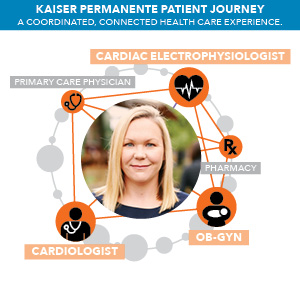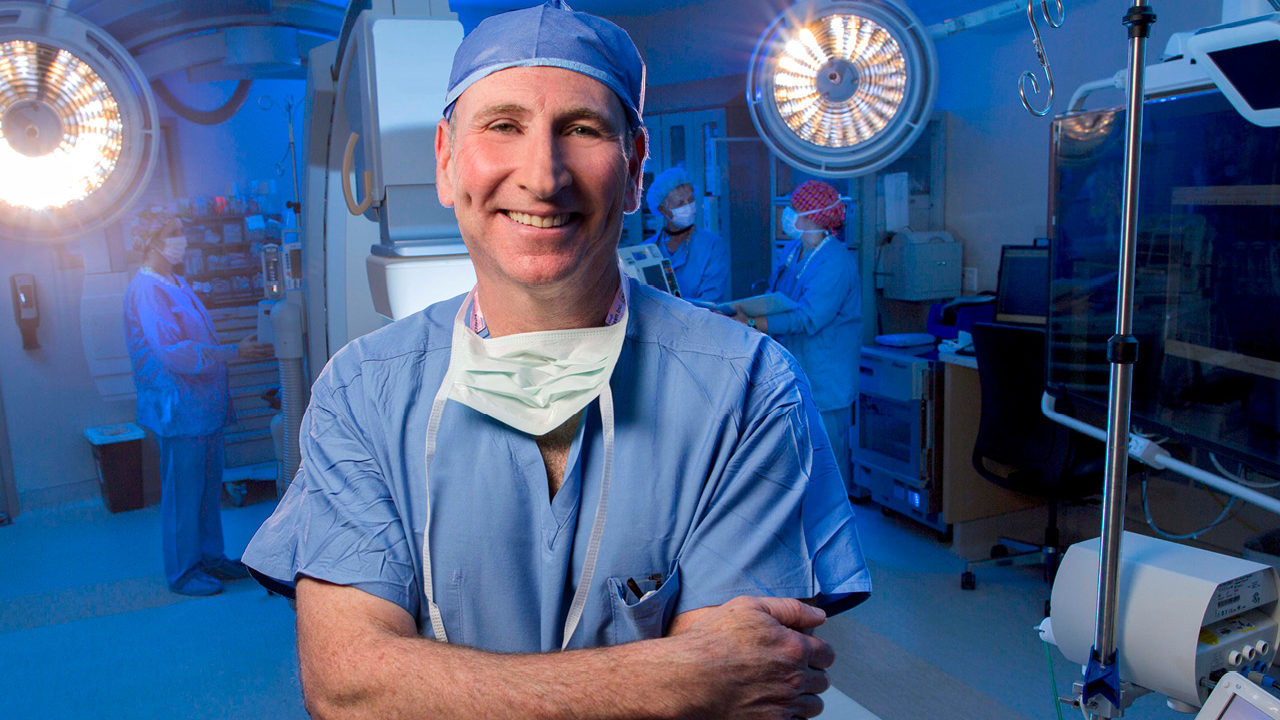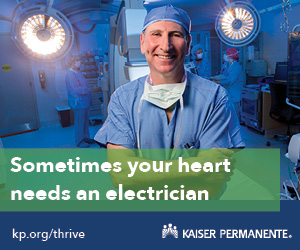4 Ways To Keep Your Heart Healthy
Heart disease is the leading cause of death for both men and women in the United States—but it doesn’t have to be. These basic lifestyle changes will keep your ticker ticking for longer.
It’s a good sign for your love life if your heart feels like it skips a beat when you see your significant other. But if it is actually skipping beats, you should get it checked by a professional.
Heart arrhythmias—problems with a heart’s rhythm that cause it to beat too quickly, too slowly, or irregularly—aren’t always serious (some people are born with them and never know they have the condition), but they can be a symptom of heart disease. Heart disease is the leading cause of death for men and women in the United States, taking the lives of more than 600,000 people every year. It encompasses a variety of heart conditions, including coronary artery disease, stroke, high blood pressure, angina, and rheumatic heart disease.
While most people with heart disease are treated by cardiologists, arrhythmia patients are typically referred to cardiac electrophysiologists (EPs), or heart doctors that specialize in the diagnosis and treatment of heart rhythm disorders. “We’re basically heart electricians,” says Laurent Lewkowiez, MD, a Permanente EP who practices at the Kaiser Permanente Colorado Franklin Medical Offices and who was named to 5280’s 2018 Top Doctors list. “The plumbers [cardiologists] open up your blood vessels if you’re having a heart attack or angina. Electricians [EPs] reroute electrical signals that are going awry and leading to symptoms.” He does this by implanting cardiac devices such as pacemakers and defibrillators or performing minimally invasive catheter ablations to rid the heart of tissue that’s causing an irregular rhythm, among other procedures.
Whether you need a “plumber” or an “electrician,” you can find a board-certified cardiac physician specialist at Kaiser Permanente. The integrated health care system ranks in the top 10 nationally—and number one in Colorado—for controlling high blood pressure, according to the National Committee for Quality Assurance. Controlling high blood pressure is key to preventing strokes and heart attacks. “Some of the best cardiovascular outcomes come out of Kaiser Permanente,” says Dr. Lewkowiez.
While certain heart conditions are genetic, there are simple lifestyle changes everyone can adopt to improve their heart health. Here are four tips to keep your ticker ticking properly—so it only skips beats metaphorically.

Eat right.
Obesity is a major risk factor for heart disease, as are high blood pressure, cholesterol levels, and sleep issues. “Heart disease is the number-one killer [in this country] because of our diets,” Dr. Lewkowiez says. Doctors and researchers say that even small changes in our diets, such as substituting fresh foods for processed options or cooking one more meal at home each week, can have outsized benefits. A proper diet, combined with exercise (see “Get Moving” below) can significantly reduce your risk of heart disease, Dr. Lewkowiez says. In fact, a 2016 study in the New England Journal of Medicine found that even among people who have a high genetic risk of developing coronary artery disease, a healthy lifestyle (eating healthy, exercising, not smoking, and controlling for obesity) reduced their risk of developing heart disease by 50%.
In general, heart-healthy diets consist of plenty of fruits and vegetables, fiber-rich ingredients, whole grains, lean meats, fish rich in omega-3 fatty acids, and healthy fats from items such as nuts. Sodium, added sugars, and alcohol should be consumed in moderation. Kaiser Permanente offers nutrition education and counseling resources to help patients adopt and stick with healthy eating habits.
Get moving.
Your heart is a muscle, and exercise is good for it. Movement can make your heart more efficient, improving its ability to pump blood through your body and pull oxygen from your blood; enhance blood flow in the small blood vessels surrounding the organ (blockages can result in heart attacks); and increase the amount of good cholesterol in your system. Unfortunately, many adults aren’t winning the battle against our modern sedentary lifestyle. A recent Centers for Disease Control and Prevention (CDC) report found that almost one-third of people between the ages of 35 to 64 “performed less than 10 minutes of activity a week,” despite the fact that the CDC recommends 150 minutes a week of moderate-intensity (or 75 minutes of vigorous-intensity) aerobic activity to achieve “substantial health benefits.”
Just getting started? It’s OK to start slow—in fact, it’s recommended. Take a brisk walk around your neighborhood, or try to jog for 10 or 15 minutes, and slowly build up the duration. Sign up for a strength-based workout at a nearby gym. The most important thing is that you stop sitting and start moving.
Stop smoking.
Smoking is one of the major risk factors for heart disease. The chemicals in tobacco damage your blood cells and can impact how your heart functions. Coronary artery disease (CAD), the most common form of heart disease, occurs when your coronary arteries become clogged with plaque. One action that can lead to clogged arteries? Smoking.
Stopping smoking, while not easy, is a major step toward improving your health. The National Heart, Lung, and Blood Institute puts it succinctly: “One of the best ways to reduce your risk of heart disease is to avoid tobacco smoke. Don’t ever start smoking. If you already smoke, quit. No matter how much or how long you’ve smoked, quitting will benefit you.” Because quitting is not easy, Kaiser Permanente offers a number of resources and programs to help patients quit, and providers work with patients to choose the most effective methods for them.
Find a doctor who uses electronic health records.
A September report in the Journal of the American Medical Association noted that electronic health records (EHRs) can be effective tools in reducing preventable cardiovascular events because they can identify at-risk patients—for example, smokers—and send information, like intel on a smoking cessation program, directly to them.
While many health care providers have adopted EHRs recently, they’ve been standard practice at Kaiser Permanente for more than a decade. But unlike other health care networks, Kaiser Permanente is an integrated system. That means its doctors share a single EHR and can access a patient’s medical record regardless of medical specialty or location. In non-integrated networks, multiple providers in different specialties and at different locations might all have different EHRs, so they can’t easily share information and might not have access to a patient’s complete medical history.
“I can contact the patient’s primary care provider immediately after I see the patient, and they have full access to my notes,” Dr. Lewkowiez says. “I can send the notes to the pharmacist to review for medication. If there’s a problem [a new medication could have a bad interaction with something the patient is already taking], I know about it as soon as I order a medication. It happens within a few keystrokes,” he says. “We all work together.”
Kaiser Permanente’s integrated system also means Dr. Lewkowiez can immediately confer with his colleagues, including the general cardiologist and the Doctor of Pharmacy, to make sure his patients are getting the best care. Rather than waiting weeks to see a specialist, Dr. Lewkowiez can perform an electronic consult within a day, or a colleague can refer a patient to him immediately.
Often, these consultations occur across specialties. For instance, Jodi Gibson, MD, a Permanente ob-gyn who was also named a 5280 Top Doctor, recently told 5280 how her team consulted with a Kaiser Permanente cardiac electrophysiologist about a pregnant patient who had a defibrillator (a surgically implanted device that uses electrical pulses to correct abnormal heart rhythms). Dr. Gibson said they wanted to make sure they did everything possible to ensure a safe delivery, given the patient’s heart condition. Outside of Kaiser Permanente, this type of consultation might not happen.
Bottom line: Some forms of heart disease are preventable, and we can all benefit from eating healthier and exercising more. But in some circumstances, you might need to consult a heart “plumber” or “electrician.” Read more about Kaiser Permanente’s cardiac care at kp.org/thrive.
Dr. Lewkowiez is among more than 1,200 Permanente physicians serving Kaiser Permanente members across Colorado. Other Permanente physicians who were named to 5280’s 2018 Top Doctors list include:
Matthew S. Koehler, MD-Anesthesiology
Keri J. Propst, MD-Anesthesiology
Jennifer N. Kelloff, MD-Child Abuse Pediatrics
Laurent Lewkowiez, MD-Clinical Cardiac Electrophysiology
Elisa S. Kapler, MD-Dermatology
Barry A. Schoelch, DO-Diagnostic Radiology
Ryan Paterson, MD-Emergency Medicine
Deborah Fromm, MD-Family Medicine
Daniel P. Jones, MD-Family Medicine
Micheline Kuhr, MD-Family Medicine
Jennifer Osborne, MD-Geriatric Psychiatry
Margrit Juretzka, MD-Gynecologic Oncology
Alexander R. Menter, MD-Hematology, Medical Oncology
Frank Becky, MD-Internal Medicine
Lynn L. Rooney, MD-Internal Medicine
Stephen P. Johnson, MD-lnterventional Radiology
Morgan L. Swank, MD-Maternal & Fetal Medicine
Heidi Ray, MD-Neurology
Sirisha Komakula, MD-Neuroradiology
Eric K. Bode, MD-Nuclear Medicine
Jody L. Gibson, MD-Obstetrics & Gynecology
Tyler L. Skaife, MD-Orthopedic Sports Medicine
Timothy R. Muratore, MD-Orthopedic Surgery
Gary L. McDonald, MD-Otolaryngology
David Barclay, MD-Pediatric Anesthesiology
Brian Bagrosky, MD-Pediatric Radiology
Sorenna Kirkegaard, MD-Pediatrics
Sarah Beth Van Scoy, MD-Pediatrics
Edward T. Melkun, MD-Plastic Surgery
Kristy Bauman , MO-Pulmonary Disease
John Christopher Sohayda, MD-Radiation Oncology
John-Paul Morfin. MD-Rheumatology
Walter D. Conwell, MD-Sleep Medicine
David C. Gerhardt, MD-Sports Medicine
Christopher Jockel, MD-Surgery of the Hand
Justin Green, MD-Urology




